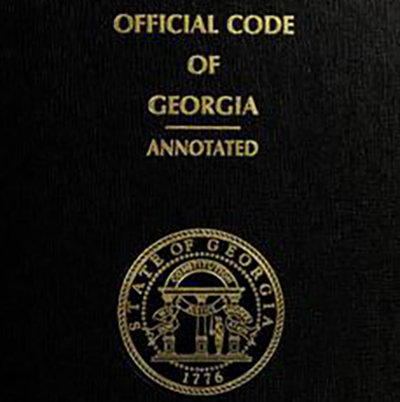In unusual lineup, SCOTUS rules annotations in Georgia state code can't be copyrighted

A bound volume of the Official Code of Georgia Annotated. Photo from the Georgia Code Revision Commission.
The U.S. Supreme Court ruled 5-4 Monday that the annotations in Georgia’s official annotated code are not eligible for copyright protection.
The court majority included a mix of liberals and conservatives. Chief Justice John G. Roberts Jr. wrote the majority opinion, joined by Justices Sonia Sotomayor, Elena Kagan, Neil M. Gorsuch and Brett M. Kavanaugh.
The court ruled against Georgia in its suit for copyright infringement against open law advocate Carl Malamud, who posted 186 volumes of Georgia’s annotated code to the website Public.Resource.org.
Georgia’s official annotated code is assembled by the 15-member Georgia Code Revision Commission, a majority of whom are state lawmakers, Roberts said. The commission contracted with Matthew Bender & Co., part of the LexisNexis Group, to compile the current Georgia code and to prepare the annotations.
The annotations appear beneath each statutory provision. Generally, they include summaries of relevant judicial decisions and state attorneys general opinions, along with a list of related law review articles and reference materials. In addition, editor’s notes often provide information about the origins of statutory text.
The text is approved by the state legislature. LexisNexis has the exclusive right to publish the annotated code, as long as it limits the price and makes a version without annotations free online.
Roberts said the annotations can’t be copyrighted under the government edicts doctrine, which holds that government officials who speak with the force of law can’t copyright the works that they create in the course of their official duties.
“Because Georgia’s annotations are authored by an arm of the legislature in the course of its legislative duties, the government edicts doctrine puts them outside the reach of copyright protection,” Roberts said.
Twenty-two states and Washington, D.C., rely on arrangements similar to Georgia’s to produce annotated codes, according to a dissent by Justice Clarence Thomas.
“The majority’s rule will leave in the lurch the many states, private parties and legal researchers who relied on the previously bright-line rule,” Thomas wrote. “Perhaps, to the detriment of all, many states will stop producing annotated codes altogether.”
Thomas argued that annotations can be copyrighted, although Congress can step in and change the law. His dissent was joined Justice Samuel A. Alito Jr. and mostly joined by Justice Stephen G. Breyer.
Justice Ruth Bader Ginsburg wrote a separate dissent that was also joined by Breyer.
The case is Georgia v. Public.Resource.org Inc.
Hat tip to SCOTUSblog.
Write a letter to the editor, share a story tip or update, or report an error.


